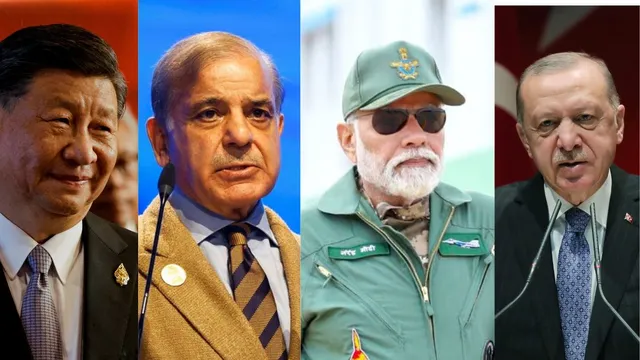- By Supratik Das
- Fri, 04 Jul 2025 03:27 PM (IST)
- Source:JND
India's recent Operation Sindoor has revealed a worrying new reality on its western border, not only Pakistan but even China and Turkey actively supported Islamabad's military operation against India, making the border area a real-world "testing lab" for cutting-edge weapons and techniques. This disclosure, by Lieutenant General Rahul R Singh, Deputy Chief of Army Staff (Capability Development and Sustenance), highlights the enhanced security threat emanating from the China-Pakistan-Turkey nexus.
Today addressing the New Age Military Technologies seminar hosted by FICCI in Delhi, Lt Gen Singh revealed some new but as yet unreported information on the short but ferocious four-day war that broke out on May 7. “This time, it was not just Pakistan,” he said. “It was actually three adversaries working in coordination. Pakistan was on the front. China provided all possible technological, hardware, and real-time intelligence support. Turkey’s contribution, mainly drones and tactical equipment, added a new layer to the threat matrix.” Lt Gen Singh explained how China utilized its good relationship with Pakistan to deploy sophisticated platforms and reconnaissance systems against India. “Pakistan had live updates of our critical vectors, this real-time data was shared by China. It served as a live testing ground for Chinese systems, including air-to-air missiles and surveillance assets,” the senior officer stated. According to Stockholm International Peace Research Institute (SIPRI) data, China sold over 8.2 billion USD worth of weapons to Pakistan between 2015 and 2024, with Islamabad now receiving nearly two-thirds of China’s total arms exports, making it Beijing’s largest defence client.
Chinese J-10C, PL-15E Missiles' Combat Debut
One of the war's biggest developments was China's 4.5-generation J-10C multirole fighter jets making their combat debut under the Pakistan Air Force umbrella. The PL-15E air-to-air missile, whose range is 145 km, was used for the first time in combat operations against India's fighters. Other developed Chinese systems like the ZDK-03 Karakoram Eagle airborne early warning aircraft and HQ-9 air defence missile system are also in Pakistan's arsenal. India officially confirmed that it had destroyed one HQ-9P system during the conflict.
The Bayraktar Drones By Turkey Bring New Dimension
To China's direct support, the increasing military cooperation between Turkey and Pakistan brought a crucial new dimension. "Turkey has supplied drones, such as Bayraktar models, which altered the dynamics," Lt Gen Singh indicated. The employment of Turkish-origin drones for reconnaissance and potential offensive missions during the clash represents an extension of Ankara's defence presence in South Asia. Pakistan and Turkey have increased joint military exercises, arms sales, and technology transfers in recent years. Turkish drone manufacturers are said to transfer UAV manufacturing technology to Pakistani partners, bolstering Islamabad's drone warfare capability.
Lt Gen Singh praised the Indian Armed Forces for their calibrated and accurate counter-strikes. He pointed out how this time around, the messaging of the leadership was "unambiguous," without any scope for ambiguity or undue restraint. "Today there is no room to take in the pain the way we used to take it several years ago. We struck 9 out of 21 known terror infrastructure targets. The decision to strike was made in the last hour, with the support of data, surveillance, and human intelligence," he stated.
China-Pakistan Economic Corridor And Strategic Depth
China's extensive military entanglement with Pakistan is rooted in the China-Pakistan Economic Corridor (CPEC), a signature Belt and Road Initiative (BRI) project worth billions of dollars connecting Gwadar Port in Pakistan to China's Xinjiang province. China views Pakistan as an important strategic balance against India, which gives Beijing critical land and naval access to the Indian Ocean. Defence cooperation, arms sales, and battlefield real-time support are natural extensions of this relationship.
While China's befriending of Pakistan is long-standing, Turkey's alignment with the China-Pakistan axis is newer but important. Ankara has upgraded relations with Beijing to "strategic cooperation" under its "Asia Anew" policy. Turkey has become a member of multilateral fora like the Shanghai Cooperation Organisation (SCO) where China is a dominant player. In spite of membership in NATO, Ankara has become increasingly close to Beijing for infrastructure investment, energy cooperation, and defence technology transfers, including naval and drone assets. Turkish and Pakistani special forces held joint exercises in Cherat earlier this year. Turkish anti-submarine corvettes and C-130 military transport aircraft appeared at Karachi during the height of the India-Pakistan crisis, highlighting the operational depth of the relationship. China and Turkey also diplomatically coordinated to support Pakistan during the clash. Chinese Foreign Minister Wang Yi openly reiterated China's pledge to support Pakistan's "sovereignty, territorial integrity, and national independence."
ALSO READ: Did EAM Jaishankar Admit Pakistan Attacked India And Downed Rafale Jets? Govt Debunks False Claims
The rising China-Turkey-Pakistan axis is a major threat to India's border security, air defence readiness, and regional strategic hegemony. Lt Gen Singh emphasized the need for India to heavily invest in strong air defence capabilities, multi-domain warfare technologies, and enhanced technology assimilation to counter impending threats that are converging physical, cyber, cognitive, and electronic warfare domains.

